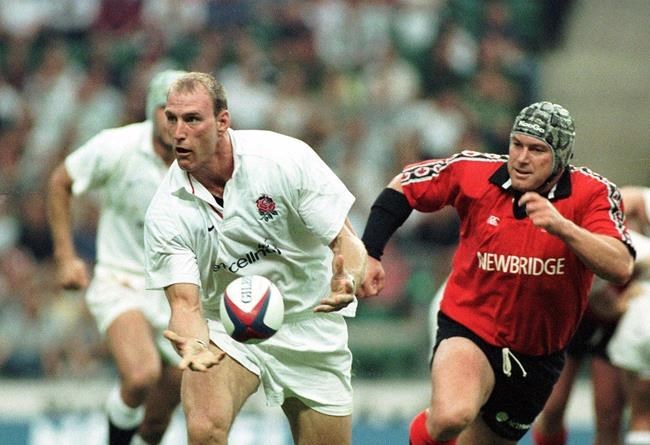While Canada sits out the men's Rugby World Cup for the first time, former captain Gareth Rees maintains his perfect attendance record at the tournament.
Rees became the first man to play in four World Cups when, despite a heavily strapped right thigh, he led Canada out against host France in 1999 in Beziers.
Ignoring a nagging knee injury and thigh strain, Rees kicked a penalty and a conversion in a 33-20 Canada loss. And he led the way on a day of smash-mouth defence, almost decapitating his slender counterpart Thomas Castaignede with a high tackle that triggered a yellow card.
Now 56, Rees is serving as a TV analyst for World Rugby's host broadcaster. The Victoria native is working nine matches in the pool stage, starting with Saturday's contest between No. 13 Italy and No. 19 Romania in Bordeaux.
The 20-team tournament starts with a bang Friday in Paris with third-ranked France facing No. 4 New Zealand, a three-time World Cup winner.
After retiring as a player following the '99 World Cup, Rees has attended the tournament as Rugby Canada CEO (2003), team manager (2015) and media manager (2019). He served as a tournament ambassador in 2007 and attended the 2011 event which coincided with his World Rugby Hall of Fame induction.
Rees, who made his World Cup debut at the inaugural 1987 competition, says the tournament has been "huge" for Canada.
"It's been a great way of finding out where we stand and giving us a focus," Rees, whose day job is director of strategic relations at Rugby Canada, said from France.
The Canadian men, currently ranked 23rd in the world, were forced to the sidelines after losing two-legged qualifying series against the 18th-ranked U.S. (58-50 on aggregate) and No. 22 Chile (54-46).
Seventeenth-ranked Uruguay then beat the Americans (54-30) to become Americas 1 and slot into Pool A at the tournament while Chile joined Pool D as Americas 2 with wins over Canada and the U.S. (52-51). Chile, the first debutant at a World Cup since Russia in 2011, becomes the 26th different nation to feature in the tournament.
Rees sees the glass half-full, saying Canada has two more years to prepare for the next World Cup.
He recalls the 1991 World Cup, where Canada lost 29-13 to New Zealand in the quarterfinals. It remains the only time Canada has made it out of the pool stage.
"Earning the right to get to that quarterfinal," remains a high point of his career.
The Canadians got to the knockout round by beating Fiji 13-3 and Romania 19-11 before losing 19-13 to host France in their final pool game.
"That was a decade in the making," Rees explained. "That was a decade of sitting on planes to New Zealand and getting well beaten by New Zealand provinces and learning our lesson and having touring teams come in."
The current Canadian squad is plowing a similar furrow, coming off a pair of losses (28-3 and 36-12) in Tonga as part of the 15th-ranked Pacific Islanders' World Cup preparations.
Rees recalls the night of the Romania win back in '91.
"We would normally have our drinks after the game — and many of them because we were basically social rugby players. I came down to the bar to have an orange juice, which is rare for me after the game. And there were six or seven other guys in the bar with the same mindset, saying 'Hey, our job's not done here.'"
Much has changed in the world rankings since the draw for this tournament was held in December 2020, resulting in a lopsided bracket.
The top five ranked teams — Ireland, South Africa, France, New Zealand and Scotland — are bunched on one side of the bracket with Ireland, South Africa and Scotland fighting it out in Pool B. Only the top two from each of the four pools move on to the quarterfinals.
The draw was held early to help sell tickets, with venues and fixtures determined so fans could book their travel.
While Fiji's upset win over England drew headlines prior to the tournament, Rees is not convinced the gap has closed between the so-called Tier 1 and 2 nations as much as some think.
"I think we're going to have some big (lopsided) results, unfortunately," he said. "I've got Romania in the first game (against Italy) and it's a massive ask of them."
"The depth of these lower-ranked teams is really going to be tested," he added. "And the way the game is played now, you need a big bench. There's (disciplinary) cards being handed out. There's a lot of physical impact. So I think the depth is going to be an issue."
Rees also notes the skill level of second-ranked South Africa, another three-time tournament winner, saying many of the Springbok forwards could play in the backs.
He expects a physical tournament with injuries and officiating playing a key role.
"I do think this World Cup is probably going to test the squad. Who has the best squad. So when a card comes out — and it doesn't take much to get a card in the modern game, whether it's yellow or red — who's going to be able to hold it together?"
Rees points to top-ranked Ireland as a team that has the depth and "understanding" to make a run.
The former Canada skipper knows all about red cards.
At the 1995 World Cup, Rees and prop Rod Snow were ejected with South African James Dalton in Canada's final game of the tournament after taking exception to the way Canadian winger Winston Stanley was tackled into the sideline advertising boards in a tackle by Pieter Hendricks.
The incident marked the first time in international rugby that three players had ever been ejected in a game.
---
Follow @NeilMDavidson on Twitter
This report by The Canadian Press was first published Sept. 7, 2023
Neil Davidson, The Canadian Press




